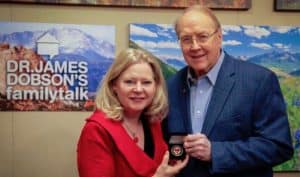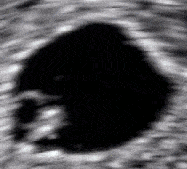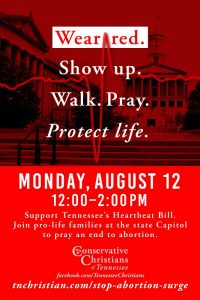This list includes an action point for Tennesseans.
Heartbeat in Preborn Baby at Five Weeks and Five Days Gestational Age
Key point: Heartbeat legislation not only will protect the youngest among us, it also has the potential to end abortion altogether. The state of Tennessee ought to be among the states involved this movement by enacting a heartbeat bill. If you are a Tennessean, you can help make this happen by participating in a special event on Monday, August 12, 2019. Item #6 provides details of the event, and the other items describe the broader context—a context pro-lifers need to understand. Let’s come together and make a life-affirming difference on this issue!

On Thursday, April 11, 2019, Ohio Governor Mike DeWine signed into law a bill that protects preborn children with detectable heartbeats from abortion. At the signing ceremony, Governor DeWine said, “The signing of this bill today is consistent with” the respect for life that government ought to consistently demonstrate by safeguarding it from its beginning to its natural end. Further, he said, it’s consistent with “the imperative [government has] to protect those who cannot protect themselves.”
The champion of the Ohio Heartbeat Bill—and actually of heartbeat legislation everywhere—is Janet Porter of Faith to Action. Porter is the author of the 2011 Ohio Heartbeat Bill, which was the first of its kind. On two separate occasions a heartbeat bill made its way to the Governor’s desk in Ohio, only to be vetoed by then governor John Kasich. On the second occasion, the veto nearly was overridden. By the time the legislation passed a third time in 2019, Ohio had a new governor in Mike DeWine, who readily signed the bill.
Some states, including New York and Illinois, have loosened restrictions on abortion even to the point of putting the mother at risk and legally permitting a baby who is alive outside the womb be killed or to be left to die. These represent the most extreme and radical of laws. Against this backdrop, other states, like Ohio, are considering and enacting heartbeat bills.

On Monday, May 6 and Tuesday, May 7, 2019, Dr. James Dobson interviewed Mrs. Porter on his radio program, Family Talk. The following insights and themes have been gleaned largely from these two programs.
1. The heartbeat bill is is about protecting preborn persons.
What does a well written heartbeat bill do? Here’s the answer:
If a heartbeat is detected, the baby is protected.
It’s that simple, and it’s that easy to understand.
2. The heartbeat bill is scientific.
Because a beating heart is a clear sign of life both scientifically and medically, heartbeat bills rest solidly on science. Who’s opposing science? Those pushing for unregulated abortion! Who’s swimming upstream against modern medical technology and evidence? Those opposed to protecting preborn babies with beating hearts! And because heartbeats typically begin in a preborn around the fifth or sixth week of pregnancy, a well crafted heartbeat bill will protect nearly every child who potentially might be aborted.
3. The public supports heartbeat legislation.
In February 2017, using a sampling of 1,002 adults, the Barna Research Group conducted a scientific poll on the heartbeat bill. The margin of error for the poll is plus or minus 3.1 percentage points.
Here was the statement to which people were asked to respond.
“If a doctor is able to detect the heartbeat of an unborn baby, that baby should be legally protected.”
Of all respondents,
-
-
-
-
- 69 percent agreed strongly,
- 13 percent neither agreed nor disagreed, and
- 18 percent disagreed strongly.
-
-
-
Of Republicans,
-
-
-
-
- 86 percent agreed strongly,
- 8 percent neither agreed nor disagreed, and
- 6 percent disagreed strongly.
-
-
-
Of Democrats,
-
-
-
-
- 55 percent agreed strongly,
- 20 percent neither agreed nor disagreed, and
- 25 percent disagreed strongly.
-
-
-
Of Independents,
-
-
-
-
- 61 percent agreed strongly,
- 13 percent neither agreed nor disagreed, and
- 27 percent disagreed strongly.
-
-
-
Candidates for public office, you’re on notice! Heartbeat legislation is a winning issue!
Heartbeat legislation is a winning issue!
4. The heartbeat-bill movement is strategic. The goal is to put an end to the horrific practice of abortion.
As you may know, Ohio isn’t the only state that has passed a heartbeat bill; numerous other states have passed or are considering heartbeat legislation.
Check here to learn more about Ohio, as well as about the legislative activity to enact heartbeat bills in Arkansas, North Dakota, Iowa, Kentucky, Mississippi, Georgia, Missouri, Louisiana, South Carolina, Michigan, and Tennessee. Also learn about pro-life legislation in Alabama.
Not surprisingly, the bills passed in many of these states have been blocked by the courts, including the laws in North Dakota and Arkansas, the first two states to pass heartbeat legislation. Yet, even in defeat, we can see evidence the seeds of victory have been sown. Janet Porter explains,
While the 8th U.S. Circuit Court of Appeals was bound by precedent to turn down the Arkansas and North Dakota Heartbeat laws, they asked the Supreme Court to take up the case, arguing that it should be the states who decide. The 8th Circuit Court rightly declared that “heartbeat” is a “more certain and consistent” indicator of life than the one the Supreme Court is currently using: viability.
The Supreme Court has said the states can protect human life if there’s a likelihood of survival to live birth. But the indicator they’re using now is a lousy one. In “Life, Heartbeat, Birth: A Medical Basis for Reform,” constitutional law professor David Forte points out that the determination of viability can be as much as 90 percent wrong, while detectable heartbeat is as much as 99 percent right. Heartbeat is the most accurate indicator of whether a child in the womb will survive to live birth. That means the court can simply move the line of allowable legal protection to a place that is more in keeping with its intent — heartbeat.2
For this reason, heartbeat-bill proponents—including Janet Porter3 and former Ohio state representative and heartbeat-bill chief sponsor Christina Hagan4— are hoping and even anticipating with excitement the likelihood that heartbeat-bill legislation will wind up at the Supreme Court.
There’s more. The heartbeat-bill movement is strategic in yet another way. Even in states controlled by Democrats, just getting a heartbeat bill filed in the state legislature will create discussion and publicity that will save children’s lives. Mrs. Porter said, “Just the publicity, just getting this out, it’s like putting a billboard across your state or across America that ‘abortion stops a beating heart,’ but instead of that, ‘a beating heart will stop abortion.”

How, then, has “the pro-life state of Tennessee” responded to the heartbeat-bill movement? A heartbeat bill passed the Tennessee House of Representatives on Thursday, March 7, 2019 by a vote of 65 to 21. The bill was championed in the Senate by Senator Mark Pody of Lebanon, who worked tirelessly for its passage. Nevertheless, on Tuesday, April 9, the Senate Judiciary Committee sent the senate version of the heartbeat bill to a summer study committee. This put the legislation on hold, at least for now. The study committee will meet to consider the proposal on Monday and Tuesday, August 12 and 13, 2019.
On April 9, 2019, the Tennessee Senate Judiciary Committee sent the senate version of the heartbeat bill to a summer study committee. The study committee will meet to consider the proposal on Monday and Tuesday, August 12 and 13, 2019.
As states surrounding Tennessee have passed laws protecting life, out-of-state abortions have been increasing.
-
-
-
- Channel 3 News, a CBS affiliate in Memphis, has reported an 8% increase in the number of Abortions performed at “Choices,” an abortion clinic in Memphis.
- Channel 4 News, an NBC affiliate in Nashville, reports “Tennessee could become ‘hot spot’ for abortions”.
- Knox News said “As neighboring states like Alabama and Georgia pass laws to sharply restrict access to abortions, clinics in Knoxville anticipate that women will end up crossing into Tennessee for care. In fact, they’re already seeing more patients” (emphasis added)
-
-
These trends ought not to surprise us. In fact, they should motivate us all the more to apply pressure on the members of the Tennessee legislature to pass a well written heartbeat bill. This is the goal, but even as we work to pass such a bill, our efforts will bear immediate fruit. Recall what Janet Porter told Dr. Dobson: “Just the publicity, just getting this out, it’s like putting a billboard across your state or across America that ‘abortion stops a beating heart,’ but instead of that, ‘a beating heart will stop abortion.” Thus, an increase in public awareness on this issue is a threat to the abortion industry—and a lifeline extended to unborn children!
Abortion stops a beating heart; but with the heartbeat bill, a beating heart will stop abortion.
—Janet Porter—
5. Despite their pro-life claims, some Republicans actually are less than fully pro-life, and they need to be held accountable.
In part 2 of the 2-part Family Talk series on heartbeat-bill legislation, Janet Porter spoke honestly about how difficult it was to get numerous Republicans who had promised to vote pro-life to actually do so. Go here to hear an informative one-minute-twenty-second clip from the program. Given the opportunity to advise listeners on how to effectively contend for and pass legislation, Janet Porter said, “Do not give up influence for access.” Come out of the woodwork! Contact your representatives and senators! Bombard them with phone calls and visits, but email them as well. And do so in large numbers! Be polite, but be firm. Let them know you sent them there to do a specific job, and you’re watching them to make sure they do it!
Do not give up influence for access.
—Janet Porter, advising citizens about relating to their elected officials—
“Rattle their cage, man!” said Dr. Dobson.
“We did!” responded Porter. That’s what it took in Ohio, and that’s what it will take everywhere else as well.
The Democratic Party is extreme on abortion. Democrats’ almost limitless support for abortion, and their strident opposition to even the most basic restrictions on abortion, put them dramatically out of step with the American people. Because of their opposition to simple abortion clinic safety procedures, support for taxpayer-funded abortion, and rejection of pregnancy resource centers that provide abortion alternatives, the old Clinton mantra of “safe, legal, and rare” has been reduced to just “legal.” We are proud to be the party that protects human life and offers real solutions for women.
—The 2016 Republican Party Platform—
Tennesseans must hold Republicans—especially some powerful Republicans in the Senate (like Senator Mike Bell and Lt. Governor Randy McNally [go here and here, respectively])—accountable. Both maneuvered to keep the Senate from voting directly on the heartbeat bill during this legislative session. Earlier in the session, the House version of the bill had passed in the lower chamber 65 to 21.
David Fowler of the Family Action Council of Tennessee has issued a challenge to both Christians and Republicans regarding the heartbeat bill. You can read his words of wisdom here.
6. Prayer is essential in this critical battle to protect the preborn.

From start to finish, prayer was an essential part of the efforts in Ohio to pass heartbeat legislation. Significantly, Ohio’s state motto is “With God all things are possible.” While the state motto of Tennessee is “Agriculture and Commerce,” this fact does not in any way diminish the truth that “with God all things are possible.” It’s true in Ohio, in Tennessee, and everywhere else!
Many voices would tell us that a heartbeat bill in Tennessee is impossible, but who would have dreamed that the heartbeat-bill movement would have accomplished as much as it has? Like the spiritual warriors in Ohio and in other places where heartbeat bills have advanced, some to the point of passing, we in Tennessee need to pray, and pray fervently. Let’s ask God to give our leaders wisdom. Let’s ask Him to help us make a well-crafted heartbeat bill a reality in our state. Then we need act accordingly, relying on God to empower us to do our part to make it happen.
On Monday, August 12, a special event at the Tennessee Capitol will give you opportunities both to pray and to act to advance the Tennessee Heartbeat Bill. Conservative Christians of Tennessee is holding a prayer walk at the Capitol during the time the Senate study committee is scheduled to meet regarding the heartbeat bill. Learn more about the event here. Come to the Capitol on Monday, August 12, beginning at noon. Wear red. Walk, pray, and protect life.
7. Christians and other concerned citizens must never give up fighting to protect the most vulnerable among us.
Janet Porter told Dr. Dobson on the second day of the broadcast series that while the work thus far has been difficult, and while it will continue to be challenging, it’s easier than it was at first. Many Christians, she said, initially thought the heartbeat bill approach “was ridiculous.” They were “used to regulating abortion and they weren’t really used to actually something that would end nearly every abortion.” The heartbeat-bill movement, however, gives advocates for life a real shot at ending abortion! The number of states enacting heartbeat bills is growing! Hopefully, Tennessee will be one of them. It’s easier now than when this effort first started.
So, we can’t give up.
Janet Porter: Even though…darkness is getting darker, what I see is that God’s people are realizing that God has given us the power, the authority. He’s given us the ability to take dominion, and I’m telling you what, this chance that we’ve been given, we had better well use it, because it may not come again.…
Dr. Dobson: Don’t give up the fight.
Janet Porter: Don’t quit, and I’ll you what. I’m tired of marching too. I’m tired of talking. It’s time we end this. Instead of talking about abortion, debating abortion, marching about abortion, let’s end abortion, and that’s what the heartbeat bill will do. That’s what it will do in nearly every single case. Keep in mind, as technology increases, we’re going to hear that heartbeat younger and younger. We’re going to save more and more….
As technology increases, we’re going to hear that heartbeat younger and younger. We’re going to save more and more!
—Janet Porter—
8. God cares deeply about the preborn.
I want to close with a video showcasing beautiful inside-the-womb photography and a powerful song by Mary Rice Hopkins. The images, along with her song, remind us that “God knows about the first heartbeat.”
Copyright © 2019 by B. Nathaniel Sullivan. All rights reserved.
Unless otherwise indicated, Scripture passages have been taken from the New King James Version®. Copyright © 1982 by Thomas Nelson, Inc. Used by permission. All rights reserved.
top image credit—three-story heartbeat-bill balloon: www.heartbeatbill.com
image credit—heartbeat in preborn baby at five weeks and five days gestational age: – Own work — (For more information, go here and here.)
photo credit: Ohio Governor Mike DeWine
Notes:
– Own work — (For more information, go here and here.)
They said it was, “more consistent and certain, more scientific than viability,” which is just a guess of how advanced our technology may be. But a heartbeat, as it turns out, that if you’ve got a heartbeat, a detectable heartbeat in an unborn baby, there is a 95% to 98% likelihood that that child will survive to live birth, which is precisely what the Supreme Court said they’re looking for. States, you’re allowed to protect life, as long as there’s a likelihood of survival to live birth, and we’re giving them the opportunity. They don’t even have to overturn Roe versus Wade to uphold this, to say move your marker from viability, which is miles away from our goal of conception, down to heartbeat, which is inches away from our goal.
3On the Family Talk program airing on May 7, Janet Porter told Dr. Dobson, “But this bill, make no mistake, this bill was crafted to be the arrow in the heart of Roe versus Wade. We want it to go up to the supreme court and that’s been its plan from its conception.”
4Christina Hagan, a member of the Ohio House of Representatives from March 2, 2011 to December 31, 2018, previously was a chief sponsor of the Ohio Heartbeat Bill. (Two efforts to enact the legislation were unsuccessful.) Hagan agrees that the bill “was crafted specifically to challenge Roe v. Wade.” In a Fox News interview showcased in an article dated February 18, 2019, Hagan was asked about exceptions such as rape or incest. She said this: “Every pro-life measure that’s been passed and enacted into law in the state of Ohio has not had that exception, because we value all life across the board, regardless of the circumstance in which it was conceived. It doesn’t change the humanity of the child, and thus the law should protect all classes of individuals equally.” Hagan added that America is “the most medically advanced nation in the world” and the medical and scientific evidence affirms that supporters of heartbeat-bill legislation “are on the right side of this issue.” This movement, Hagan further indicated, is both wide and deep, with support strongly evident among the young and in a growing number of states as well as across the nation. Hagan went on to cite the results of the Barna poll—the same one Janet Porter later would cite on Family Talk: “The Barna poll actually suggests that this isn’t a partisan issue. People believe, in all walks of life, that children with beating hearts should be protected.” Strong majorities of Republicans, Independents, and Democrats “agree that children with beating hearts in utero should be protected from the horrendous life-ending act of abortion.”



Be First to Comment